How To Stay Green: Vegetable Production
This week’s episode is to quench some rousing fire in the nation. I’d be educating us on how to stay green. The body system needs a very healthy diet but based on recent happenings around the nation, the use of chemicals on foodstuff has become a rising challenge and I think the best way to deal with it will be discussed soon. More than eighty percent of vegetables, fruits and other agricultural produce are planted inorganically (the use of chemicals during one phase or another) and research has shown that they turn out to be carcinogenic in the nearest future – this is due to their residual effect over time.
Health is wealth after all
This week’s episode will be channelled towards the almighty “VEGETABLES” – How to Plant and Other Tips. It is not something that scary or mighty as you fear because you need not a large area of land as the small corner piece of your home will do and that’s all. Trust me, after this episode you are good to go!
So, let’s start with the grammar… Definition of vegetable.
A vegetable is an edible plant cultivated majorly for consumption by man. A vegetable can either be roots, tubers, bulbs, stems, leaves or seed. Majority loves a different form of vegetable and it has established itself over time especially in Nigeria – Quite affordable and easy to cook.
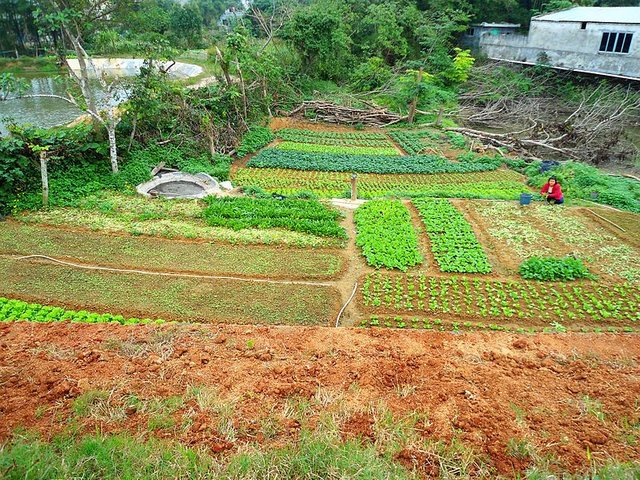
Do you know what your favorite vegetable is called?
There are various types of vegetables, but I would be highlighting few which includes Carrot (Root crop), Lettuce (Salad crop), Celery (Salad crop), Cabbage (Cole crop), Cauliflower (Cole crop), Radish (Root crop), Onion (Bulb crop), Garlic (Bulb crop), Cucumber (Cucurbits), Watermelon (Cucurbits) and Tomato/ Pepper (Solanaceous fruits). But majorly, I would be highlighting three distinguish vegetables today, they are classified based on leafy part. They are:
- Amaranthus spp
- Celosia argentea and
- Corchorus olitorius
Found your favorite vegetable? Click the link below for more.
Click here for the list of vegetables.
IMPORTANCE OF VEGETABLES
- They are cholesterol free with usually low fat
- They contain many nutrients with essential vitamins (A, B6, C, K and many more)
- They reduce the occurrence of diseases like heart attack, blood pressure, stroke, cancer and so on.
Ensure not to eat them raw as they might contain some toxins and anti-nutrients.
Cook Properly to deactivate the effect of the anti-nutrients
AMARANTHUS SPECIE
This is usually found in Nigeria though most people categorize them as a weed. They are called Spiny or thorny amaranth .
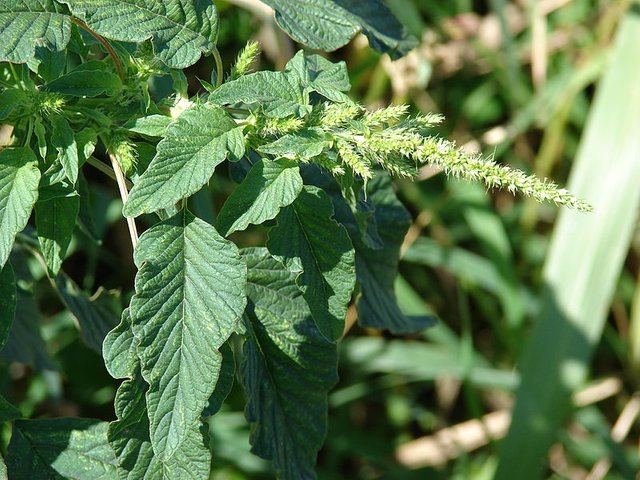
Wikimedia commons: Amaranthus spinosus by Forest and Kim Starr licensed by Creative Commons Attribution 3.0 Unported
It has quite unique properties as it increases the amount of water and salt excreted from the body as urine. The leaf is also very effective in the treatment of burns and pimples. It belongs to:
Kingdom: Plantae
Family: Amaranthaceae
Genus: Amaranthus
Sauer (1955) grouped them into monoecious (the male and female flower are on a plant) and dioecious species (the male and female flower are on a different individual plant)
Is the image familiar already? I'm sure your lips smack. This is commonly known as “Ẹfọ Tẹtẹ” in South-west Nigeria, what is called in your tribe?
CELOSIA ARGENTEA
Well in Nigeria it is called “Ẹfọ Sọkọ yọkọtọ” with common names as Celosia or Lagos Spinach. Every part of the vegetable is edible. It can also be used in soap making.
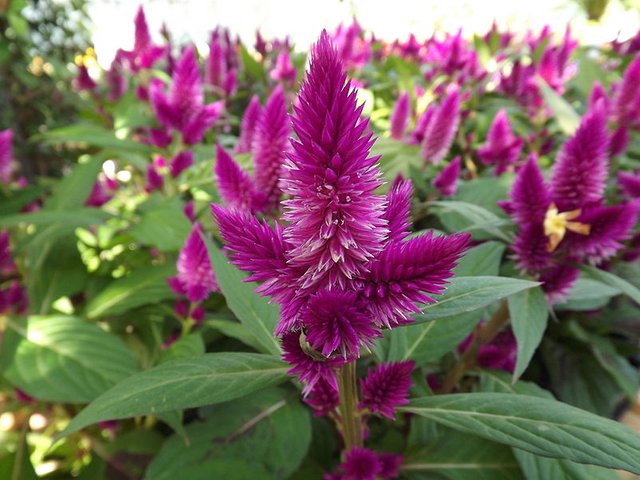
Wikimedia commons: Celosia argentea by Hedwig Storch licensed by Creative Commons Attribution 3.0 Unported
The flower and seed are effective in treating dysentery, bloody stool and the liquid from the leaf is a very good body wash used in treating skin infections and injuries. It can also be used to treat snake bites. This is commonly known as “Ẹfọ Sọkọ” in Nigeria and “Troublesome weed” in China. – I’m sure you love it!
CORCHORUS OLITORIUS
Hehe, the south west people of Nigeria are quite familiar with this. Permit me, but the long name above means Jute mallow or “Ewedu” as it is called in Nigeria. The name Corchorus was coined by Carl Linnaeus (Swedish botanist).
Corchorus olitorius also known as Jute mallow contains vitamin A (for sight), C (for circulation) and E (increases stamina). It is also rich in beta carotene. Japanese usually grind the leaves and induce it into beauty pills for women – How organic! It can be stored by keeping it wet (20°C) and it can last for a week.
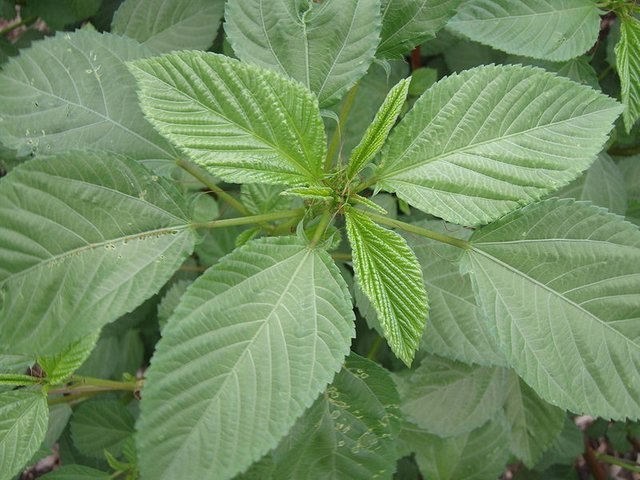
Wikimedia commons: Corchorus olitorius licensed by Creative Commons Attribution 3.0 Unported
The demand is higher than production across the world with Bangladesh as the highest producer.
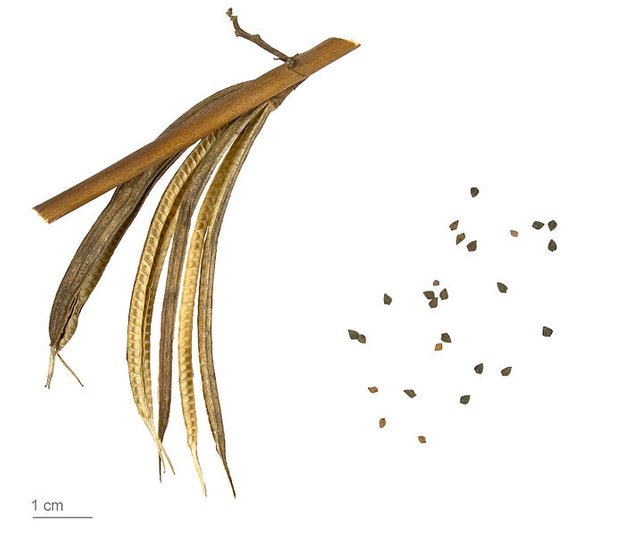
Wikimedia Commons: Seed of Corchorus olitorius by Rogers Culos licensed by Creative Commons Attribution 3.0 Unported
PROPAGATION OF AMARANTHUS, CELOSIA AND CORCHORUS
These three Vegetables (Amaranthus spinosus, Celosia argentea and Corchorus olitorius) can be propagated via seed only. This simply means it can be planted through seeds only. I have taken it upon myself to highlight the steps involved. Sit back and relax...
Step 1
A planting site is required. It is the foremost that determines your success as a farmer. Soil type, topography, proximity to water and sunlight are things to put into consideration. All this factors go hand in hand.
- Soil type: a loamy soil is best for vegetable production.
- Topography: a porous soil with good physical attribute (not sloppy) and absence of stones.
- Water: This is very essential. Water has to be provided (Irrigation) in the absence of rainfall or excessive sunlight.
- Sunlight: A vegetable farm cannot be situated under a shed, enough sunlight is paramount.
Step 2
Level the soil; make a small bed and embankment to avoid washing away of seed.
Ensure the surface is smooth
Step 3
Manure is needed to enrich the soil fauna. Poultry droppings, Animal dungs and human excreta and many more will do perfect justice. Just a little will do- spread it on the topsoil.
There is no need to turn the soil, just spread
Step 4
Leave it for about two days so that the manure can incorporate.
Step 5
Visit your nearest market (Farmers or local market) to purchase any of your favourite vegetable seed. Note that; the seed needs scarification (removal of seed coat for faster germination).
- Pour the seed into a light clothing material that can allow absorption.
- Boil water to 100°C then pour into a bowl.
- Dip the cloth into the hot water for about forty-five to sixty seconds
- Remove the cloth, open and dry in air.
- Pack after it is dry.
- Your seed is ready for planting
The above process is called SEED SCARIFICATION
Step 6
It is time to plant. There are two methods best for planting – your choice though.
- Broadcasting method: involves randomly spreading of seed on the prepared bed. The seeds will be scattered.
- drilling method: involves spot drilling. A straight line is drawn and the seeds are placed in it. This is to ensure uniformity and to ensure control of weeds.
Step 7
Sprinkle light sand on the seeds
Step 8
Shower with water (lightly- to avoid washing away) every morning and evening provided there is no rain.
Conclusion
Vegetable production is easy and once you start, you’d realize how much you have been missing organically. I am not against buying of vegetables but for economic and financial benefits growing of certain agricultural produce for subsistence purpose is highly recommended. You can also own your green farm so you can stay organic and healthy. For health benefits, consumption of vegetables is highly essential and advisable.
References
VEGETABLE NUTRIENTS
VEGETABLE PRODUCTION
ORGANIC MANURE
SCARIFICATION
VEGETABLE FARMING
LIST OF VEGETABLES
CELOSIA ARGENTEA
AGRICULTURE NIGERIA
If you found this post useful, don’t forget to drop a comment, resteem and upvote. Thank you for your time and on an ending note, “Do Agric, It Pays”.
If you write STEM (Science, Technology, Engineering, and Mathematics) related posts, consider joining #steemSTEM on steemit chat or discord . If you are from Nigeria, you may want to include the #stemng tag in your post. You can visit this blog by @stemng for more details.
One very important point that we should keep i mind is related to the seeds, in my opinion. If we move on with growing our own garden, we should at least try to buy organic seeds or reasonable ones, not those provided by big companies with a not that great politics like Mosanto. This was my two cents :)
I agree, the type and viability of the seed in question matters. Thank you for the additional point.
Turns out Iron-man is quite an all-rounder prof! Nice input
Yeah, I'm quite impressed!
I have secret capabilities ;)
Are u sure u ain't superman too?
Still investigating this one ^^
Wire your resources to me.. Lemme help to avoid self judgement
I don't think he reacts to kryptonite... So he should be Awesome man
LOL..I see
He is!
The vegetables.. Hmmm this is one food i love so much especially when they are freshly cooked.
They are so nourishing.
Interesting .. I hope you will venture into subsistence production in the nearest future
Hehehe... If i have the time.
FFO.. Is only food you like.
It's necessary to ensure survival na
But not only that now
Gbaun... Like you don't like food??
We both do 😂 😂 😂
All these vegetables you are mentioning is not for me, the only ones I know are green, tete and soko. 😂 😂
The importance of vegetables can not be overemphasized.
😄😄😄😄
Congratulations @humbledeen! You have completed some achievement on Steemit and have been rewarded with new badge(s) :
Click on any badge to view your own Board of Honor on SteemitBoard.
To support your work, I also upvoted your post!
For more information about SteemitBoard, click here
If you no longer want to receive notifications, reply to this comment with the word
STOPAwesome one you got here....Those vegetables look enticing already....The Efo tete and Ewedu got me
Nice contributions, now I know how to go about planting these lovelies....
I trust you will brother... Thanks for your usual support.
Now I can see you're ready to do "Agric".
Hopefully
#smiles
Good post!
Thank you...
I hope you've planted vegs Now...?